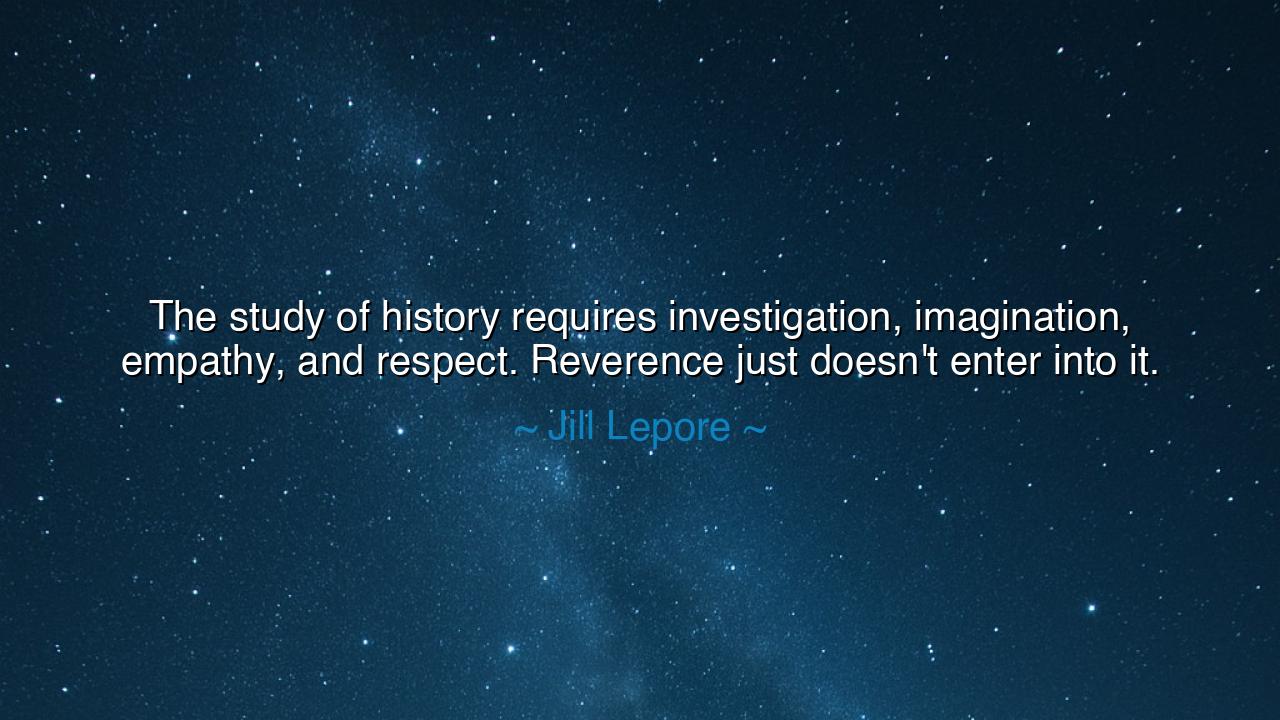
The study of history requires investigation, imagination
The study of history requires investigation, imagination, empathy, and respect. Reverence just doesn't enter into it.






“The study of history requires investigation, imagination, empathy, and respect. Reverence just doesn’t enter into it.” — thus declares Jill Lepore, historian, storyteller, and keeper of memory for the modern age. In these words, she speaks not as a chronicler of dead dates, but as a guardian of truth. She reminds us that history, the vast river of human experience, must be approached not as an altar for worship but as a living current to be understood. Her tone is both fierce and wise, for she knows that to truly see the past, one must not bow before it — one must look it in the eye.
The origin of this quote lies in Lepore’s struggle against the comfortable myths that nations tell themselves. As a historian of America, she has walked the narrow path between pride and truth, between celebration and confrontation. Her words rise from the conviction that reverence, that blind and trembling admiration, clouds the sight of those who study the past. To treat history as sacred is to imprison it; to question it, to probe it with investigation, is to set it free. Thus, Lepore places history in the realm of inquiry, not worship — a temple not for prayer, but for understanding.
In her vision, the tools of the historian are fourfold: investigation, imagination, empathy, and respect. Investigation is the blade that cuts through the lies of memory, unearthing the bones of truth buried beneath time. Imagination is the breath that gives life to those bones, allowing us to glimpse the minds and hearts of those long gone. Empathy allows us to feel their pain and passion, to understand their motives without excusing their misdeeds. And respect binds it all together — not worship, but acknowledgment; not blind devotion, but clear recognition of the humanity within every age. Through these tools, the historian becomes not a servant of glory, but a seeker of wisdom.
But why does Lepore cast out reverence? Because reverence blinds. It makes us protectors of illusion rather than seekers of truth. To revere the past is to make idols of men who were mortal, to polish their flaws into virtue, and to silence the voices of those they oppressed. The ancients knew this danger. The philosopher Thucydides, who chronicled the Peloponnesian War, refused to sing hymns to heroes; he sought only to tell what happened and why. He wrote that his work was “a possession for all time” — not because it flattered power, but because it stripped power bare. In this, he and Lepore are kin across the centuries.
Consider the story of the United States’ founding fathers. For generations, they were treated with near-divine reverence — their portraits hung in schools, their words recited like scripture. Yet Lepore, like other truth-tellers of her age, dared to investigate beyond the marble. She showed that they were visionaries, yes, but also men of contradiction — builders of freedom who tolerated slavery, proclaimers of equality who excluded women and the poor. To see them clearly is not to diminish them, but to humanize them. Reverence would have hidden these truths; investigation reveals them, allowing history to breathe in its full complexity.
In her words, there is also compassion. Lepore does not call us to scorn the past, but to understand it. The historian’s task, she teaches, is not to judge but to perceive — to enter the minds of those who lived before, to grasp the world as they saw it. For without imagination, we cannot see their world; without empathy, we cannot feel it. This balance — between the intellect that analyzes and the heart that connects — is what turns history from dry record into living truth.
And so, the lesson of Jill Lepore’s teaching is this: approach the past as one would approach a vast and ancient forest — with curiosity, humility, and open eyes. Do not worship its trees as gods, but study their roots and their scars. Seek to understand how they grew, how they fell, and how their seeds endure in you. For reverence will keep you blind, but understanding will make you wise. Respect the past, but never fear to question it. Investigate deeply, imagine vividly, empathize fully, and let these be your tools.
Thus, remember: history is not a shrine — it is a mirror. In it we see not perfection, but possibility. To study it as Lepore commands is to become both humble and awakened — knowing that the story of humanity is not a hymn to the few, but a dialogue among the many. When you seek truth without reverence, you honor it more deeply than any worshipper ever could. For only the brave dare to look upon the past and say, “Here is what was — both light and shadow — and from it, we will build what might yet be.”






AAdministratorAdministrator
Welcome, honored guests. Please leave a comment, we will respond soon